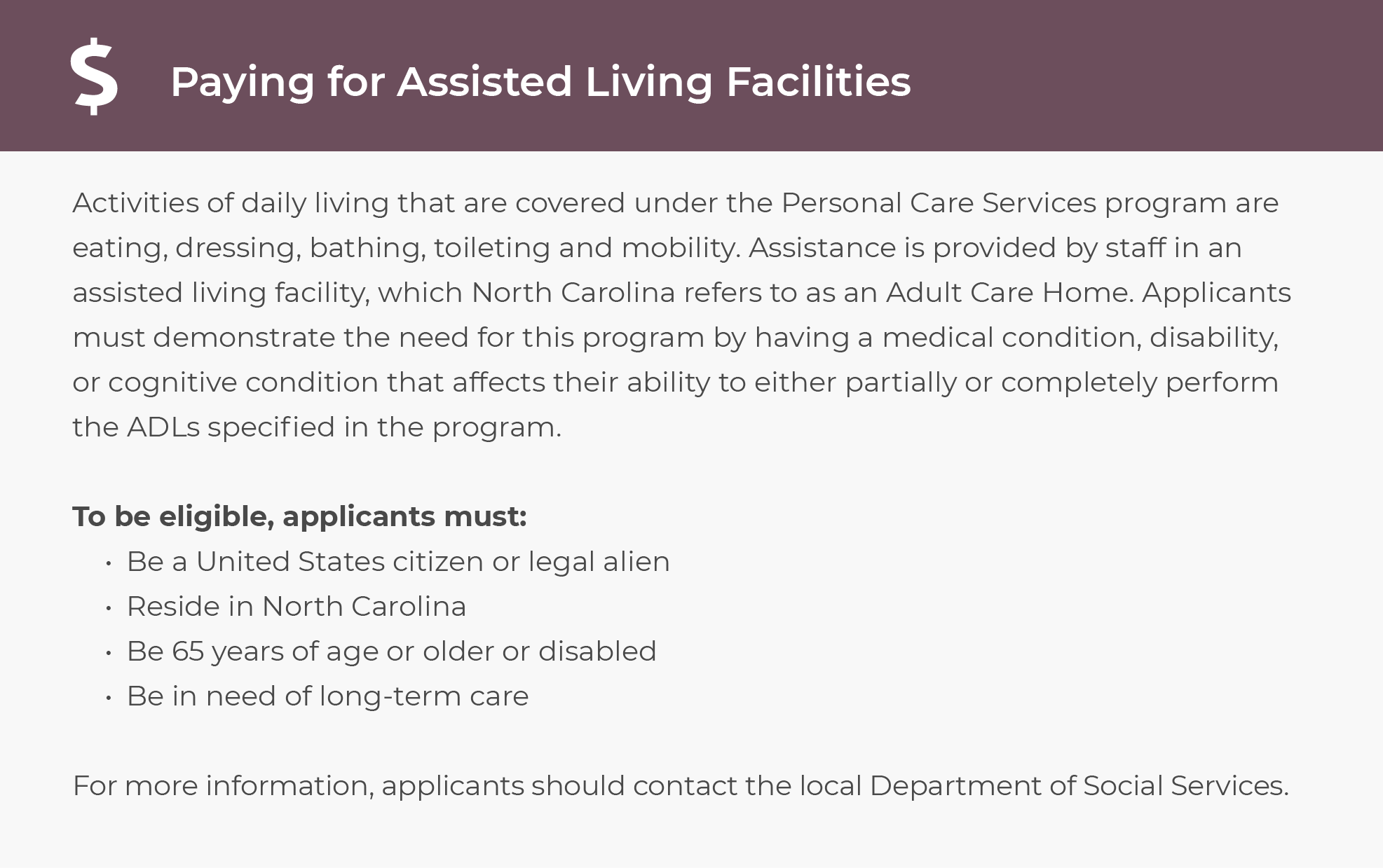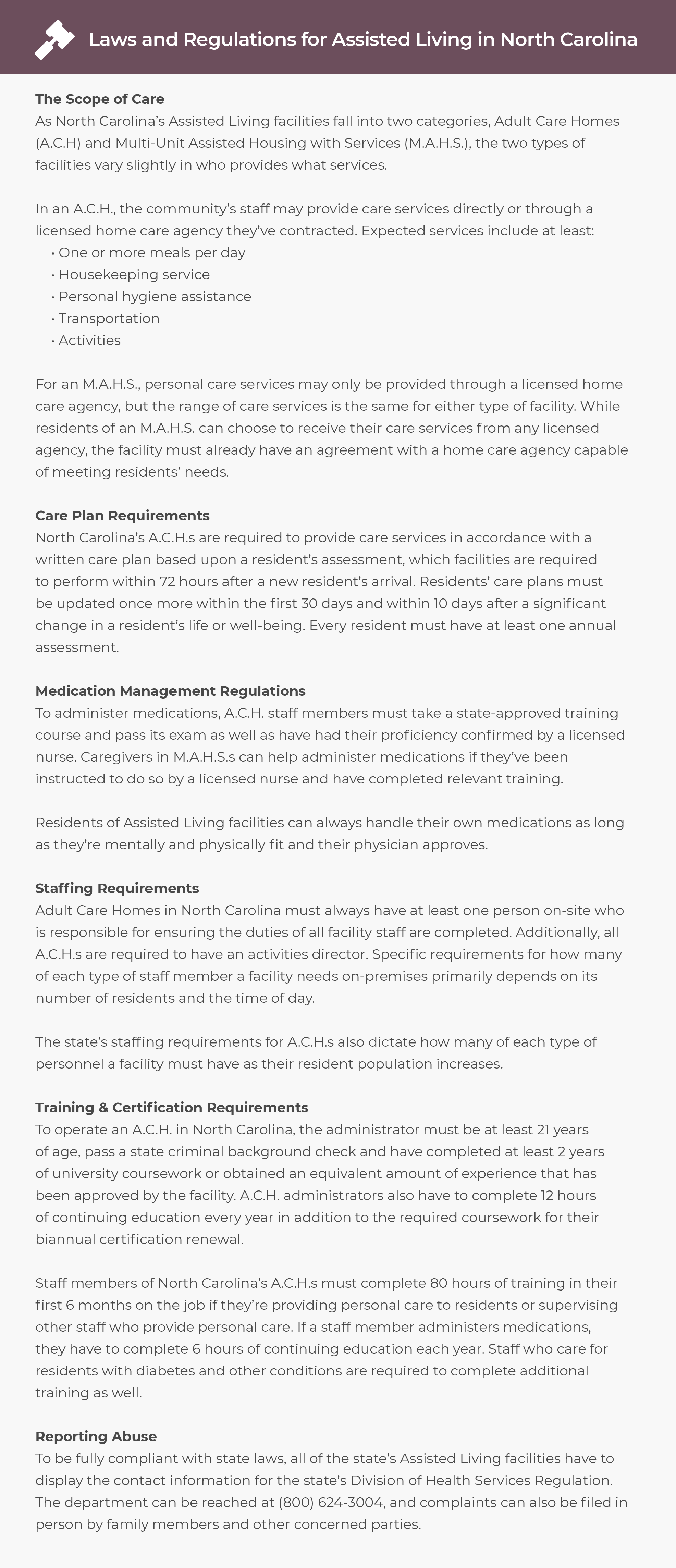Durham is among the most populous cities in North Carolina with over 280,000 residents, about 12% of whom are seniors. The city is listed on the AARP Age-Friendly Network and on Kiplinger’s 50 Best Places to Retire in the U.S. for its weather, access to health care and affordability. While summers in this city are warm with highs near 90 degrees, the weather is mild throughout the rest of the year, providing plenty of opportunities to enjoy outdoor activities. The city is home to Duke University Hospital, one of the leading hospitals in the state, and the number of doctors per capita is more than double the national average. While the city’s cost of living is higher than the state median, it’s about 5% lower than the national average, which may help your retirement income cover living expenses.
Assisted living enables you to stay in the community but get the level of care you need. These residential facilities provide daily meals and recreational activities. On average, seniors in Durham pay $4,800 per month for this type of care.
This guide provides information on assisted living rates in the city, options for paying for care and free resources that serve area seniors.
Hundreds of thousands of American seniors utilize assisted living, a figure that is only growing. For these seniors, assisted living combines residential housing,assistance in daily activities, and some healthcare. These communities also strive to provide an atmosphere that is comfortable and engaging for their residents… Read More >
COVID-19 restrictions and rules for Assisted Living Facilities are typically set by the state – to see the rules in your state, you can read our guide to Assisted Living in North Carolina. Keep in mind that there may be other policies that communities put in place to protect their residents, so you should contact your local community for more information. Additionally, you can contact your local Area Agency on Aging to learn more – find contact information here.
The 2021 Genworth Cost of Care Survey shows that seniors in Durham pay $4,800 per month for assisted living services.
Assisted living facilities in the Durham region charge $4,800 per month for services. This is high compared to the state rate of $4,010 and the national average of $4,500.
Compared to other surveyed cities in North Carolina, Durham is a relatively expensive option for assisted living at $4,800 per month. In Goldsboro, care costs are about $2,000 less than Durham’s average at $2,700 per month, and in New Bern, rates are higher but still affordable at $3,645. Facilities in Greensboro charge $3,800, and in Charlotte, rates are closer to Durham’s average at $4,400. Wilmington is the costliest surveyed city in North Carolina for assisted living services, with rates coming in at $5,254.

Since not everyone can afford to pay for assisted living out-of-pocket, it’s important to find alternative methods to help make assisted living more affordable. Some of these options include:
For more information about your options for making assisted living more affordable, visit our guide to Assisted Living in North Carolina.
|
Resource |
Contact |
Service |
|
(919) 549-0551 |
Triangle J Area Agency on Aging provides free and low-cost services to Durham residents aged 60 and over. Through this nonprofit organization, you can talk to trained specialists who can help you find assisted living services in your region and identify ways to pay for care. The agency also houses the long-term care ombudsman program, which you can contact if you need to report instances of abuse or neglect. The ombudsman can also help you understand your rights as an assisted living resident and assist you in making sure you get the services in your care plan. | |
|
(919) 560-8387 |
Durham County Veterans Services helps qualified veterans access local, state and federal veterans’ benefits. If you’re an older veteran or a qualified family member, the office can help you prepare forms and gather supporting documents to enroll in programs, such as Aid and Attendance, disability compensation and veterans’ and survivors’ pensions. The department also has a current list of resources and contact information for veterans’ seeking VA life insurance, debt management services and retired pay. It also runs MakeTheConnection.net, which provides up-to-date information on mental health services and local resources specifically for veterans. | |
|
(877) 579-7562 |
The Senior Law Project publishes information on issues relevant to older adults and those in long-term care, including an overview of powers of attorney, recognizing and reporting elder abuse and resident rights. It also has licensed legal professionals who help with civil legal issues, such as obtaining public benefits, resolving consumer issues and creating wills. Services are open to those aged 60 and over, regardless of income, but priority is given to those with limited means. | |
|
(919) 688-8247 |
Center for Senior Life is a local nonprofit organization that provides a broad range of services to seniors. It has options counselors who can help you review your care needs and find an assisted living facility that fits your lifestyle and budget, and it provides advocacy services for those in long-term care. It also provides Medicare options counseling to help you understand your health insurance benefits. | |
|
(919) 321-8910 |
Durham’s Retired and Senior Volunteer Program enables those aged 55 and over to serve their communities through exclusive volunteer activities. Through this free program, you can use your skills and experience to provide tax preparation services, tend gardens in community spaces, tutor school-aged children and share information in local museums. In exchange, RSVP provides benefits, such as mileage reimbursement and supplemental insurance. | |
|
Durham County Social Services, Division of Aging and Adult Services |
(919) 560-0300 |
The Division of Aging and Adult Services promotes access to community-based programming for older adults in Durham and the surrounding region. Through this division, individuals receiving Medicaid can arrange non-emergency medical and non-medical transportation services. The division also fields and investigates reports of elder abuse, neglect and exploitation. |
Assisted Living Facilities in the Durham area are required to follow a set of rules and regulations that are determined at the state level. For an overview of those rules and regulations, see the information below. For more specific information, talk with your local community or Area Agency on Aging.














